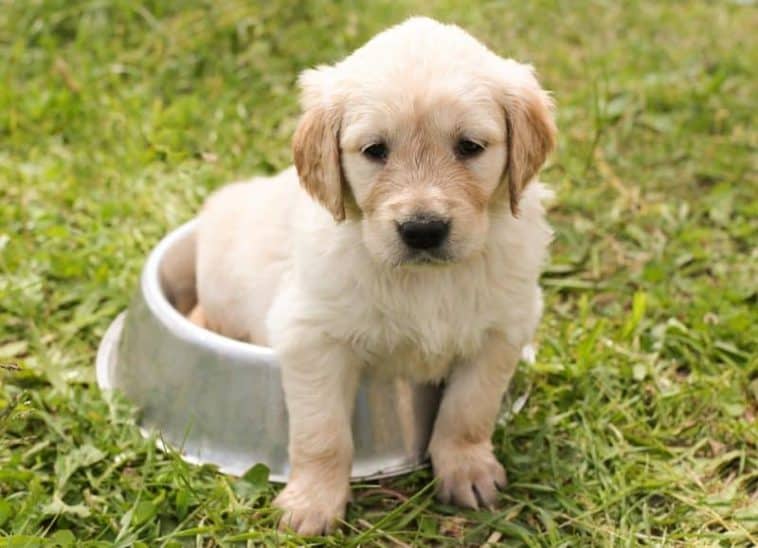Potty training your puppy may sound daunting, but it is actually quite simple when you follow the guidance given below.
It can take several months to establish a dog potty routine, but as long as you put in the time and effort, the process is pretty straightforward.
Here are 9 successful steps on how to potty train a puppy fast!
Table of Contents
1. Begin by assigning a bathroom area
Once you get your puppy home, begin by showing them where you’d like them to go to the bathroom.
This will usually be your garden or if you don’t have one, an outside area very near to your home.
Dogs naturally want to go to the bathroom away from their living area, so ensure it is a suitable distance from your regular living space.
The first couple of times they go to the bathroom, place a small amount of newspaper down before they go potty.
After you have cleaned up their waste, keep a small amount of this soiled paper near the area they are using, as it will help your puppy know where it is they should go to the bathroom.
This is the first step on how to potty train a puppy fast!
2. Spot the Signs
Knowing how to spot the common signals a dog makes when they need the bathroom can help avoid accidents.
These signs may include sniffing the floor, circling about, acting restless, or going into a room they have previously used to go to the bathroom.
3. Timing
You need to build a bathroom routine around the needs of your puppy.
Pups need the potty in a predictable way when they are very young. Puppies need to urinate immediately after waking up, so you need to be there to take your puppy straight into the garden without any delay.
Eating also stimulates their digestive system and puppies normally urinate within fifteen minutes of drinking, and usually defecate within half an hour of eating.
So be prepared to take them out to the area you have assigned as their bathroom during these windows of opportunity.
Puppies have poor bladder control and need to urinate at least every hour or two.
They also have trouble keeping it in when they get excited, so take your puppy out frequently if it has been active.
As your puppy gets older, gradually increase the time between visits to the bathroom.
Most puppies don’t have strong enough bladders to hold in going to the bathroom for the entire night, so expect a bit of mess in the mornings over the training period.
Lay down newspaper away from their sleeping area until your puppy can hold it in for longer.
4. Keep a diary
Another helpful tip on how to potty train a puppy fast is to keep a diary. It can be useful tool to keep a written record of when your puppy eats and sleeps, to help figure out when they are likely to need to use the potty.
Over the course of a few days, simply write in a notebook the action and the time it happened, and then set scheduled alarms in your phone; to remind you when you should be taking them outside.
5. Be prepared to repeat the process
When taking your puppy outside to use the bathroom, they may not realize what it is you expect of them and seem a little confused.
It’s likely they will want to play with you instead.
As tempting as this is, don’t engage them in games, as this will only distract them from the task at hand.
Instead, walk slowly around the potty area and encourage them to sniff the ground.
If they haven’t gone to the bathroom after five minutes, come back inside the house, but keep a close eye on them.
Repeat this process 10 minutes later, and 10 minutes after that if they still haven’t gone, and hopefully your puppy will eventually potty in the right place.
Set aside lots of time for this and be prepared for several visits to the garden at first.
Be patient and your persistence will eventually pay off!!
6. How to potty train a puppy fast: Use cue commands!
Regularly repeat cue words such as ‘poop’ and ‘pee’ while your puppy is actually using the bathroom.
Make sure you use different words for each action so that your dog will learn to differentiate between these sounds, as you can use them as prompts when they begin to recognize your verbal commands.
7. Home alone
During the initial stages of potty training it’s best not to leave your puppy alone until a routine is well established.
However, this is unrealistic for a lot of people, so when you do have to go out, let them have a chance to exercise outside and go to the bathroom beforehand, and then leave your dogs in a comfortable area of the house, with some paper laid out in an area away from where they eat and sleep.
This won’t necessarily teach your puppy where to go to the bathroom, but it will make any mess easier to clean up.
8. Expect accidents
Expect your puppy to have several accidents during the first few months of potty training.
You may have heard that it is a good idea to rub your puppy’s nose in any mess or point to the soiled area while telling them off, but these are not useful methods.
It’s important not to punish your puppy if they go to the bathroom in the house, as it will only frighten them and may teach them to avoid using the potty when you are around.
If your puppy has an accident when you’re not looking, calmly clean it up.
If you catch your puppy in the middle of going, quietly pick them up and put them outside to see if they can finish what they started in the assigned potty area.
Make sure to give lots of praise to your pup when they use the potty in the correct place.
9. Cleaning Up
It’s important to the health of your dog and to you, that you clean any mess in the house using a warm solution of biological washing powder or a specially formulated product from your vet.
Avoid using ammonia-based products such as Clorox bleach, as this is likely to attract your puppy to the area and cause them to use it again.
You’ll need to continue with these steps for several months, although some puppies may need some extra time and help.
During this process, remember to heap lots of praise on your puppy when they successfully use the potty.
Although potty training a puppy can be hard work and tiring, be patient and consistent, and soon your efforts will pay off.

